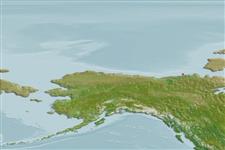Hydrozoa |
Anthoathecata |
Pandeidae
Environment: milieu / climate zone / depth range / distribution range
Ecology
Pelagic; depth range 3 - 10 m (Ref. 120471). Polar
Arctic, Western Atlantic and Eastern Pacific. Mostly polar, but also in subtropical and boreal.
Length at first maturity / Size / Weight / Age
Maturity: Lm ? range ? - ? cm Max length : 0.9 cm WD male/unsexed; (Ref. 2992)
Bell height measures 12 mm, with a rounded to pointed gelatinous apical projection; large manubrium attached to the radial canals from the top and with a large mouth and horseshoe-shaped folded gonads; 4 smooth-edged radial canals; 8-16 tentacles with laterally compressed bulbs and ocelli; transparent bell but may vary in coloration in the manubrium from reddish to yellowish to brownish (Ref. 2376).
Meroplanktonic (Ref. 120471). Passively hanging upside down, suspended below the long tentacles (Ref. 2376).
Life cycle and mating behavior
Maturity | Reproduction | Spawning | Eggs | Fecundity | Larvae
Species listed only in medusoid stage (Ref. 1663, p. 16).
Cairns, S.D., D.R. Calder, A. Brinckmann-Voss, C.B. Castro, D.G. Fautin, P.R. Pugh, C.E. Mills, W.C. Jaap, M.N. Arai, S.H.D. Haddock and D.M. Opresko 2003 Common and Scientific Names of Aquatic Invertebrates from the United States and Canada: Cnidaria and Ctenophore, Second Edition. American Fisheries Society Special Publication, no,28. XI+115. With CD-ROM. (Ref. 1663)
IUCN Red List Status
(Ref. 130435: Version 2025-1)
CITES status (Ref. 108899)
Not Evaluated
Not Evaluated
Threat to humans
Human uses
| FishSource |
Tools
More information
Trophic EcologyFood items (preys)
Diet composition
Food consumption
Predators
Population dynamicsGrowth
Max. ages / sizes
Length-weight rel.
Length-length rel.
Length-frequencies
Mass conversion
Abundance
Life cycleReproductionMaturityFecunditySpawningEggsEgg developmentLarvae PhysiologyOxygen consumption
Human RelatedStamps, coins, misc.
Internet sources
Estimates based on models
Fishing Vulnerability
Low vulnerability (10 of 100).
Price category
Unknown.
